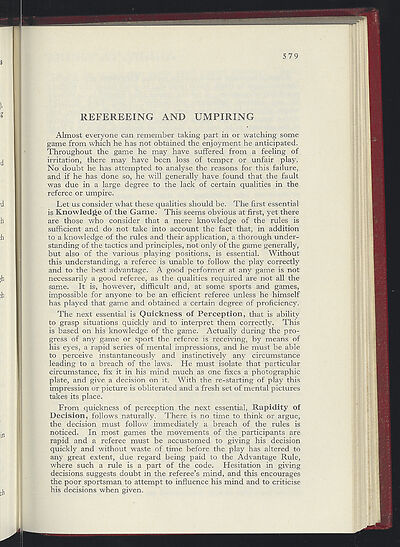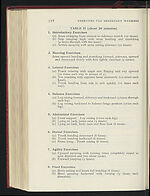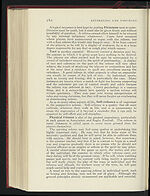1938-39
(613)
Download files
Complete book:
Individual page:
Thumbnail gallery: Grid view | List view

9
g
�d
•d
;h
b
�h
;h
in
'ch
REFEREEING AND UMPIRING
Almost everyone can remember taking part in or watching some
game from which he has not obtained the enjoyment he anticipated.
Throughout the game he may have suffered from a feeling of
irritation, there may have been loss of temper or unfair play:
No doubt he has attempted to analyse the reasons for this failure,
and if he has done so, he will generally have found that the fault
was due in a large degree to the lack of certain qualities in the
referee or umpire.
Let us consider what these qualities should be. The first essential
is Knowledge of the Game. This seems obvious at first, yet there
are those who consider that a mere knowledge of the rules is
sufficient and do not take into account the fact that, in addition
to a knowledge of the rules and their application, a thorough under-
standing of the tactics and principles, not only of the game generally,
but also of the various playing positions, is essential. Without
this understanding, a referee is unable to follow the play correctly
and to the best advantage. A good performer at any game is not
necessarily a good referee, as the qualities required are not all the
same. It is, however, difficult and, at some sports and games,
impossible for anyone to be an efficient referee unless he himself
has played that game and obtained a certain degree of proficiency.
The next essential is Quickness of Perception, that is ability
to grasp situations quickly and to interpret them correctly. This
is based on his knowledge of the game. Actually during the pro-
gress of any game or sport the referee is receiving, by means of
his eyes, a rapid series of mental impressions, and he must be able
to perceive instantaneously and instinctively any circumstance
leading to a breach of the laws. He must isolate that particular
circumstance, fix it in his mind much as one fixes a photographic
plate, and give a decision on it. With the re-starting of play this
impression or picture is obliterated and a fresh set of mental pictures
takes its place.
From quickness of perception the next essential, Rapidity of
Decision, follows naturally. There is no time to think or argue,
the decision must follow immediately a breach of the rules is
noticed. In most games the movements of the participants are
rapid and a referee must be accustomed to giving his decision
quickly and without waste of time before the play has altered to
any great extent, due regard being paid to the Advantage Rule,
where such a rule is a part of the code. Hesitation in giving
decisions suggests doubt in the referee's mind, and this encourages
the poor sportsman to attempt to influence his mind and to criticise
his decisions when given.
g
�d
•d
;h
b
�h
;h
in
'ch
REFEREEING AND UMPIRING
Almost everyone can remember taking part in or watching some
game from which he has not obtained the enjoyment he anticipated.
Throughout the game he may have suffered from a feeling of
irritation, there may have been loss of temper or unfair play:
No doubt he has attempted to analyse the reasons for this failure,
and if he has done so, he will generally have found that the fault
was due in a large degree to the lack of certain qualities in the
referee or umpire.
Let us consider what these qualities should be. The first essential
is Knowledge of the Game. This seems obvious at first, yet there
are those who consider that a mere knowledge of the rules is
sufficient and do not take into account the fact that, in addition
to a knowledge of the rules and their application, a thorough under-
standing of the tactics and principles, not only of the game generally,
but also of the various playing positions, is essential. Without
this understanding, a referee is unable to follow the play correctly
and to the best advantage. A good performer at any game is not
necessarily a good referee, as the qualities required are not all the
same. It is, however, difficult and, at some sports and games,
impossible for anyone to be an efficient referee unless he himself
has played that game and obtained a certain degree of proficiency.
The next essential is Quickness of Perception, that is ability
to grasp situations quickly and to interpret them correctly. This
is based on his knowledge of the game. Actually during the pro-
gress of any game or sport the referee is receiving, by means of
his eyes, a rapid series of mental impressions, and he must be able
to perceive instantaneously and instinctively any circumstance
leading to a breach of the laws. He must isolate that particular
circumstance, fix it in his mind much as one fixes a photographic
plate, and give a decision on it. With the re-starting of play this
impression or picture is obliterated and a fresh set of mental pictures
takes its place.
From quickness of perception the next essential, Rapidity of
Decision, follows naturally. There is no time to think or argue,
the decision must follow immediately a breach of the rules is
noticed. In most games the movements of the participants are
rapid and a referee must be accustomed to giving his decision
quickly and without waste of time before the play has altered to
any great extent, due regard being paid to the Advantage Rule,
where such a rule is a part of the code. Hesitation in giving
decisions suggests doubt in the referee's mind, and this encourages
the poor sportsman to attempt to influence his mind and to criticise
his decisions when given.
Set display mode to:
![]() Universal Viewer |
Universal Viewer | ![]() Mirador |
Large image | Transcription
Mirador |
Large image | Transcription
| Games and sports in the army > 1938-39 > (613) |
|---|
| Permanent URL | https://digital.nls.uk/248744575 |
|---|
| Description | 'Games and Sports in the Army' was an annual publication produced by the British War Office between the 1930s and 1960s. This included the Second World War. It outlines the rules and regulations for games and sports played by members of the armed forces. It features names and photographs of team members, and examples of contemporary advertising. |
|---|---|
| Shelfmark | GWB.52 |

